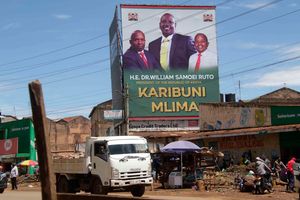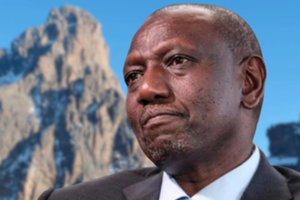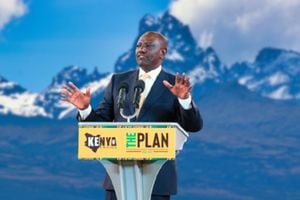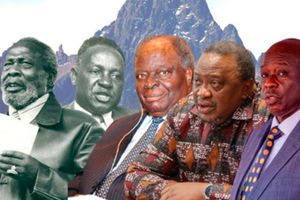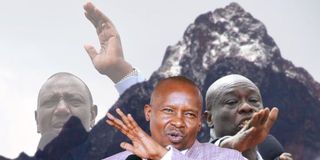
President William Ruto, Deputy President Kithure Kindiki and former Deputy President Rigathi Gachagua.
President William Ruto’s planned tour of the restive Mt Kenya region presents a major dilemma for former Deputy President Rigathi Gachagua.
The visit is expected to stir charged emotions—both supportive and hostile—with direct implications for Gachagua’s political standing.
Analysts argue that public reaction to the President will place Gachagua in a pickle. “The dilemma is no small matter. Mr Gachagua has widely been accused of isolationist politics and of trying to pull his people out of government,” says political scientist, Mr Gasper Odhiambo.
Mr Odhiambo urged caution: “Mr Gachagua must temper the emotions of his people if he hopes to maintain national appeal.”
He warns that if the President receives a hostile reception, it could damage Gachagua’s image on the national stage, where critics may accuse him of turning Mt Kenya into an isolationist stronghold.
“However,” Mr Odhiambo adds, “if the President is booed, it will also prove that Gachagua still commands considerable influence in the region.”
He argues that Gachagua—accused of tribal politics and playing to Murima passions—must reinvent himself as a national leader. “It’s a tough choice for Mr Gachagua,” says Mr Odhiambo.
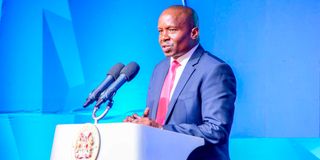
Deputy President Kithure Kindiki.
“He must decide whether to allow the President to be met with hostility, proving that Wamunyoro remains the political heartbeat of the region, or to encourage a warm reception to project a nationalistic image.”
Fearing for the worst, Murang’a Woman Representative Betty Maina has warned any youths who may be sponsored to heckle the President that they will face severe consequences.
“The government will respond firmly. We want this tour to succeed,” she said.
Political observers see the tour as a high-stakes showdown between President Ruto’s loyalists and Gachagua’s backers.
Gachagua served as Deputy President for two years before the President sanctioned his impeachment in October 2024 over “incompatibility” and replaced him with Prof Kithure Kindiki.
Since then, Mt Kenya has become increasingly hostile to both the President and his allies—some of whom have even been assaulted by voters.
On November 16, 2024, the President was booed in a church in Embu County, forcing him to cut short his speech.
Manyatta MP Gitonga Mukunji later explained: “My people were respectful and patient until he insisted that the Social Health Authority and the Social Health Insurance Fund were working.”
He said the people felt misled and briefly expressed their discontent. Political scientist John Okumu says the President’s visit presents a political spectacle.
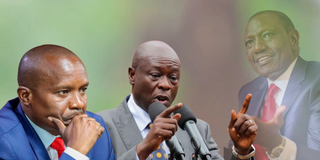
Deputy President Kithure Kindiki (left) former Deputy President Rigathi Gachagua and President William Ruto.
“Politics speaks better in reactions. We’re all eager to see how he will be received. Someone should televise every second of the tour,” he said.
Mr Okumu added: “We should not suppress people’s emotions. Feedback must be seamless. This is not just about Gachagua. It’s about trust in the President.”
“If the President enjoys public goodwill, he has nothing to worry about. But if he’s lost touch with the region, he must face the consequences—and not even Gachagua can help him.”
On February 9, 2025, Gachagua advised Mt Kenya voters to cut ties with the President and the ruling United Democratic Alliance (UDA).
He announced plans to launch a regional party in May to anchor an anti-Ruto re-election alliance, aiming to make history by unseating a sitting President.
But Laikipia Senator John Kinyua says it’s unfair to expect Gachagua to control the crowds. “Voters are the marking scheme. There are things the President might say that naturally provoke reactions,” he said.
He warned that defending the current health and university funding models or attacking Gachagua would likely spark unrest.
Kirinyaga Senator Kamau Murango said the President must be ready to interact with people’s raw emotions.
“Who said getting booed is a bad thing? Leaders must face public feedback. Otherwise, we risk dictatorship,” he said.
He emphasised that it is the voters who hold leaders accountable for promises made before elections. “All legal forms of feedback are welcome. From those reactions, we can better understand our people’s aspirations ahead of the 2027 General Election,” he said.
Tetu MP Geoffrey Wandeto, a staunch Gachagua ally, said the President must face the consequences of his own leadership.
“When he was campaigning, he mingled with families. But once in power, he distanced himself through reckless impeachment and de-whipping,” he said.

Former Deputy President Rigathi Gachagua.
“Now that he wants to hold political rallies, he must choose his words carefully to avoid provoking already angry residents.”
Mr Wandeto insisted Gachagua would not sponsor hecklers.
“That’s not our political culture. In fact, we suspect some of the President’s loyalists might sponsor hecklers and blame it on Gachagua,” he said.
Political analyst Prof Peter Kagwanja urged Mt Kenya to embrace mature politics focused on development.
“Heckling has no place in a community known for entrepreneurship. It solves nothing,” he said.
Mukurweini MP John Kaguchia said Gachagua should not be censured over a visit that has little to do with him.
“This is between the President and the people. Gachagua should only be held accountable if the President visits Wamunyoro,” he said.
He urged the President to focus on development, not 2027 campaigns, and to avoid using cheering squads.
“We’ve seen ex-gang leaders hold press conferences declaring loyalty to the government. If these gangs are used to welcome the President, people will keep away,” he warned.
Kaguchia said the President must choose between genuine public engagement and staged theatrics.
Kiharu MP Ndindi Nyoro, who was removed from his post as the National Assembly Budget and Appropriations Committee chairman, recently urged leaders to move away from rhetoric and focus on delivering the aspirations of Kenya’s founding fathers.
“We don’t remember President Kibaki for speeches. We remember roads, infrastructure, and policies we can see and touch. That should be our standard,” he said.
Trans Nzoia Governor George Natembeya criticised leaders who sponsor hecklers against grassroots politicians but demand respect for themselves.
He cited an incident where National Assembly Majority Leader Kimani Ichung’wah allegedly orchestrated heckling against him during the burial of Speaker Moses Wetang’ula’s mother in Bungoma.
“What precedent are we setting? Every politician has supporters. Elections only determine who has more. Political hygiene must start with the President and his team,” he said.
Mr Natembeya emphasised the importance of allowing free and fair political expression across the country.
“No one should be forced to guarantee how the President will be received. Let the people speak freely. That’s how he’ll get accurate feedback—not filtered intelligence briefs,” he said.

